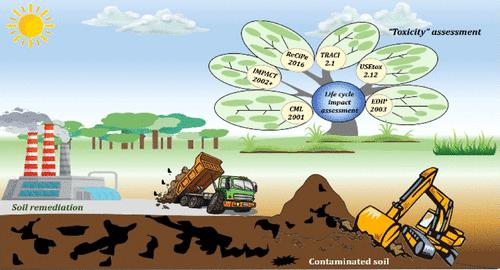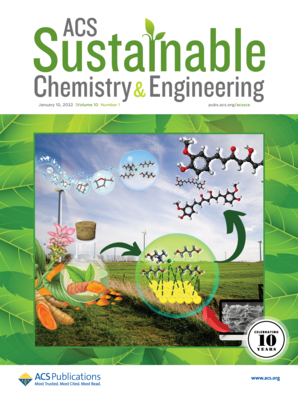Comparative Analysis of Life Cycle Impact Assessment Methodologies for Toxicity: A Case Study of Soil Remediation Technology in China
IF 7.3
1区 化学
Q1 CHEMISTRY, MULTIDISCIPLINARY
引用次数: 0
Abstract
Toxic impacts arising from soil pollution pose considerable risks to the environment and to human health. The life cycle impact assessment (LCIA) distinguishes between ecotoxicity and human toxicity, based on the contamination medium. This study compared six LCIA methodologies for assessing toxicity and implemented them in evaluating soil contamination remediation, thus revealing differences in the methodological logic and characterization factors (CFs). The LCIA methodologies in soil remediation assessments highlighted significant effects from heavy metal and inorganic emissions. The ecotoxicity analysis, employing IMPACT 2002+, TRACI 2.1, and USEtox 2.12, found that emissions of heavy metals, particularly zinc, were notably influential. In terms of human toxicity, the carcinogenic effects were substantially higher than noncarcinogenic effects, with contributions from ReCiPe 2016 and TRACI 2.1 amounting to 99.734% and 99.517%, respectively. Varied results in toxicity assessments across different LCIA methodologies likely stem from disparities in model logic and CFs, limitations of LCIA models, and differences in toxicity categorization. This research strongly supports the further development and refinement of LCIA methodologies and the strategic choice of toxicity assessment methods across various industrial settings.

毒性生命周期影响评估方法的比较分析:中国土壤修复技术案例研究
土壤污染产生的毒性影响对环境和人类健康构成了巨大风险。生命周期影响评估(LCIA)根据污染介质区分了生态毒性和人类毒性。本研究比较了六种评估毒性的 LCIA 方法,并将其应用于土壤污染修复评估,从而揭示了方法逻辑和表征因子(CFs)的差异。用于土壤修复评估的 LCIA 方法突出了重金属和无机排放物的显著影响。采用 IMPACT 2002+、TRACI 2.1 和 USEtox 2.12 进行的生态毒性分析发现,重金属排放,尤其是锌,具有显著的影响。在人类毒性方面,致癌效应大大高于非致癌效应,ReCiPe 2016 和 TRACI 2.1 的贡献率分别为 99.734% 和 99.517%。不同 LCIA 方法的毒性评估结果各不相同,这可能是由于模型逻辑和 CF 的差异、LCIA 模型的局限性以及毒性分类的不同造成的。这项研究有力地支持了 LCIA 方法的进一步发展和完善,以及在各种工业环境中对毒性评估方法的战略性选择。
本文章由计算机程序翻译,如有差异,请以英文原文为准。
求助全文
约1分钟内获得全文
求助全文
来源期刊

ACS Sustainable Chemistry & Engineering
CHEMISTRY, MULTIDISCIPLINARY-ENGINEERING, CHEMICAL
CiteScore
13.80
自引率
4.80%
发文量
1470
审稿时长
1.7 months
期刊介绍:
ACS Sustainable Chemistry & Engineering is a prestigious weekly peer-reviewed scientific journal published by the American Chemical Society. Dedicated to advancing the principles of green chemistry and green engineering, it covers a wide array of research topics including green chemistry, green engineering, biomass, alternative energy, and life cycle assessment.
The journal welcomes submissions in various formats, including Letters, Articles, Features, and Perspectives (Reviews), that address the challenges of sustainability in the chemical enterprise and contribute to the advancement of sustainable practices. Join us in shaping the future of sustainable chemistry and engineering.
 求助内容:
求助内容: 应助结果提醒方式:
应助结果提醒方式:


